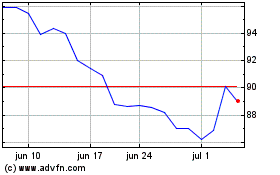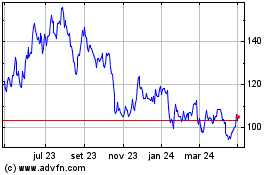By Stu Woo and Asa Fitch
In terms of technology, the world had been unifying for years.
Now it is reverting back to the likes of the VHS-versus-Betamax
era, with much bigger consequences.
Imagine two countries with completely different sets of hardware
and software for the internet, electronic devices,
telecommunications, and even social media and dating apps.
That is the direction the U.S. and China are headed in -- a
world where the two global powers have mutually exclusive
technology systems.
The wedge being driven between the two countries alarms tech's
biggest names, with the likes of Microsoft Corp. co-founder Bill
Gates and Alibaba Group Holding Ltd. co-founder Jack Ma calling it
counterproductive for both sides. While this month's signing of a
phase-one trade deal between the U.S. and China may have eased
broad, short-term economic concerns, deeply held suspicions in both
countries suggest the technology gap will only widen in the coming
decade.
A battle that had centered on the telecom industry, with the
U.S. effort to globally blacklist Chinese giant Huawei Technologies
Co. over fears of potential spying and cyberattacks, has burst into
a much wider conflict that has altered virtually every part of the
technology sector on both sides of the Pacific. Huawei has
responded by taking steps to divorce its entire supply chain from
the U.S.
China is hastening to make semiconductors and consumer
electronics without U.S. parts, after Washington restricted
American businesses from supplying Chinese companies. In social
media, the Trump administration in November opened an investigation
of Beijing-based ByteDance Inc., the maker of the hit video-sharing
app TikTok, over national-security concerns surrounding the
collection of users' personal data and the alleged censorship of
content critical of the Chinese government. That came after
Washington in March ordered a Chinese company, Beijing Kunlun Tech
Co. Ltd., to sell gay-dating app Grindr over fears that China could
use data from the app to blackmail Americans with security
clearances.
A TikTok spokesman cited an earlier statement saying that it
hadn't been asked by the Chinese government to censor content, and
that its content-moderation policies are free of any government
influence. Attempts to reach Kunlun for this article weren't
successful.
Driving the American side of this conflict are not only worries
about spying, cybersecurity and blackmail, but also concerns that
the U.S. is losing ground to Beijing in the race to develop and
implement the latest technology, including artificial
intelligence.
"The Trump administration has employed an expansive and novel
definition of national security to set back Chinese firms working
in everything from memory chips to social media," says Dan Wang, a
Beijing-based technology analyst for research firm Gavekal
Dragonomics. "Over the longer term, the strategic solution for
Chinese firms is straightforward: develop technology capabilities
so that they're not so dependent on U.S. supply."
Years of conflict
The history of the technological divide goes back at least a
decade, with China firing one of the first shots when it censored
search results from Google. The company essentially left the
Chinese market in 2010, thus beginning an era of two internets: one
for China and one for the rest of the world. With Google and
Facebook Inc. restricted in China, citizens there flocked to
homegrown giants, such as search-engine Baidu Inc. and WeChat,
Tencent Holdings Ltd.'s messaging, social-media and payment app.
Such Chinese tech giants help Beijing by censoring sensitive
content and monitoring the activities of Chinese citizens. Baidu
and Tencent didn't respond to requests for comment for this
article.
Telecom became the focal point in 2012, when Congress all but
banned Huawei from major U.S. business by concluding the Chinese
company couldn't refuse a hypothetical order from Beijing to spy or
conduct a cyberattack. Huawei denies that it could use its products
to spy or conduct cyberattacks on Beijing's behalf.
A year later, documents leaked by Edward Snowden alleged that
the National Security Agency could hack into telecom equipment made
by both Huawei, which relied on American components, and Silicon
Valley's Cisco Systems Inc. That could have spurred Beijing to move
Chinese companies away from U.S. dependence, analysts say.
These skirmishes finally exploded into a full-blown
technological battle shortly after President Trump took office in
2017. The confrontation had two fronts: trade and national
security. On trade, President Trump implemented tariffs on China
for its alleged unfair trade practices -- such as forcing U.S.
companies to share technology with Chinese ones in exchange for
access to the Chinese market, an issue that wasn't resolved by the
phase-one trade pact. As for national security, his administration
took steps to hinder Huawei and to slow Chinese advances in
technology, especially that with military applications. U.S.
officials have stressed that the scrutiny of Huawei, ByteDance and
some other companies is rooted in national-security issues that are
separate from trade.
"2017 was the first time that an administration began to take
this on seriously, in a way that would radically change things,"
says Robert Spalding, who served on the White House's National
Security Council from 2017 to 2018.
Concern in the U.S.
The White House tried to make it harder for Huawei to build its
equipment by restricting American suppliers from selling parts to
the company. It also tried to stanch the flow of cutting-edge
computer technology to China to hinder its ability to build the
first next-generation supercomputers.
Enmeshed in the global supply chain, many American tech
companies have opposed efforts to decouple the U.S. from China.
Semiconductor manufacturers, in particular, have a lot to lose in
the dust-up because China is both a manufacturing hub and a growing
market for computers, smartphones and other electronics containing
their chips. The U.S. exported about $7 billion of chips to China
in 2018, substantially more than it imported from China.
Putting the screws to trade is forcing China to develop its own
industry and seek new, non-U.S. suppliers -- things the country has
already started to do, hurting American chip makers' revenues.
Huawei recently managed to build a smartphone without U.S. parts --
a feat that would have been improbable a couple of years ago.
"There's definitely a bifurcation, and I think the U.S.
semiconductor companies are very concerned," says Handel Jones,
chief executive of International Business Strategies, a
semiconductor consulting firm in Los Gatos, Calif. "As the Chinese
companies strengthen, the pie available for U.S. companies gets
smaller."
The Trump administration, however, has largely ignored industry
concerns. After imposing a ban on trade with Huawei last year, it
allowed companies to apply for licenses to continue shipping to the
telecom giant. But many haven't been approved and decisions haven't
come quickly, according to people familiar with the process.
The battle lines are different in social media, where U.S.
suspicion focuses on China's alleged use of apps to spy and to
advance China's political agenda, such as blocking videos and posts
that portray Beijing negatively.
In that arena, the Trump administration has ratcheted up
pressure by threatening to undermine Chinese companies' bids to
build user bases in the U.S. The national-security review of TikTok
and the demand that Beijing Kunlun Tech sell Grindr are part of
that effort.
An inevitable split?
Even if the U.S. and China mend fences and end their
long-running trade dispute, analysts say mutual suspicion all but
guarantees the march toward a two-system tech world will continue.
China is developing its domestic semiconductor industry and may
compete with the U.S. in Europe and other markets. The U.S. might
exclude Chinese hardware and smartphone apps from its market -- and
try to convince allies to follow suit.
In such a world, the race for technological dominance could come
with high stakes, handing the winner a stronger economy and greater
global influence than it could gain in a more integrated
market.
Who will win the technology race, under any circumstances, is an
open question. China may be behind for now, but some observers say
it's quickly catching up on what may be the next front in this
race: It is pouring tens of billions of dollars into
artificial-intelligence research that could be key to the next
technological revolution.
Mr. Spalding, the former National Security Council member, says
one American concern about Chinese ownership of popular apps is
that it gives Chinese companies more data that they can use to
improve their artificial intelligence.
Mr. Jones of International Business Strategies emphasizes the
importance of AI to both countries. "AI is high on the priority
list, and we think AI is a major differentiator in areas like
autonomous driving, virtual reality, augmented reality and even
medicine," he says. "We think AI is going to be a key factor in
terms of who's going to win and lose in the next five to 10
years."
Mr. Woo is a Wall Street Journal reporter in Beijing. He can be
reached at stu.woo@wsj.com. Mr. Fitch is a Journal reporter in San
Francisco. Email asa.fitch@wsj.com.
(END) Dow Jones Newswires
January 20, 2020 13:02 ET (18:02 GMT)
Copyright (c) 2020 Dow Jones & Company, Inc.
Baidu (NASDAQ:BIDU)
Gráfico Histórico do Ativo
De Mar 2024 até Abr 2024

Baidu (NASDAQ:BIDU)
Gráfico Histórico do Ativo
De Abr 2023 até Abr 2024
